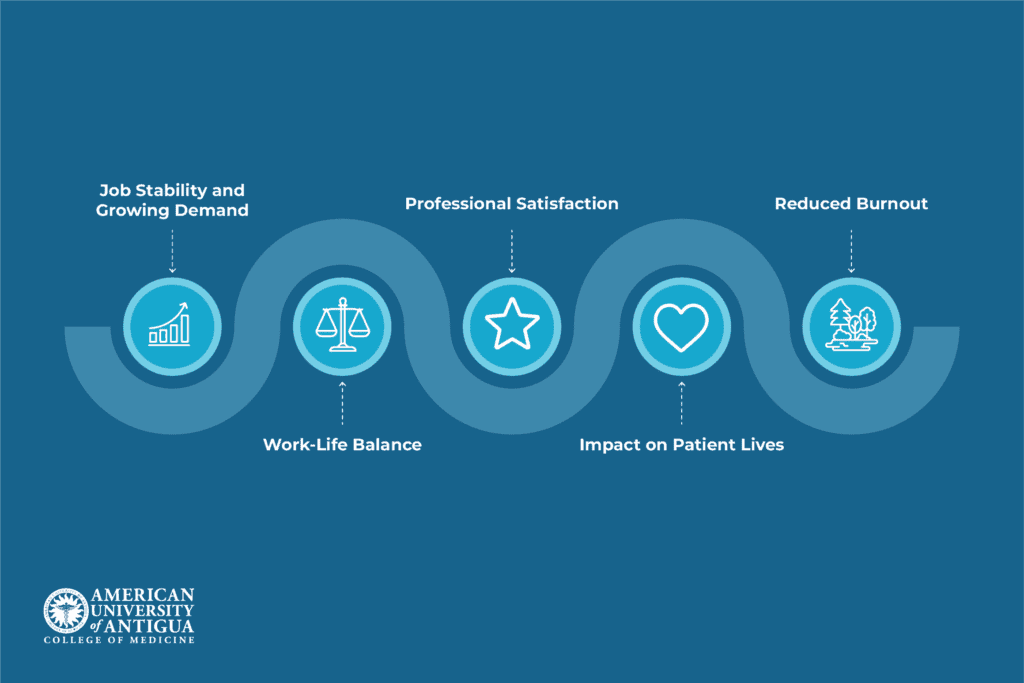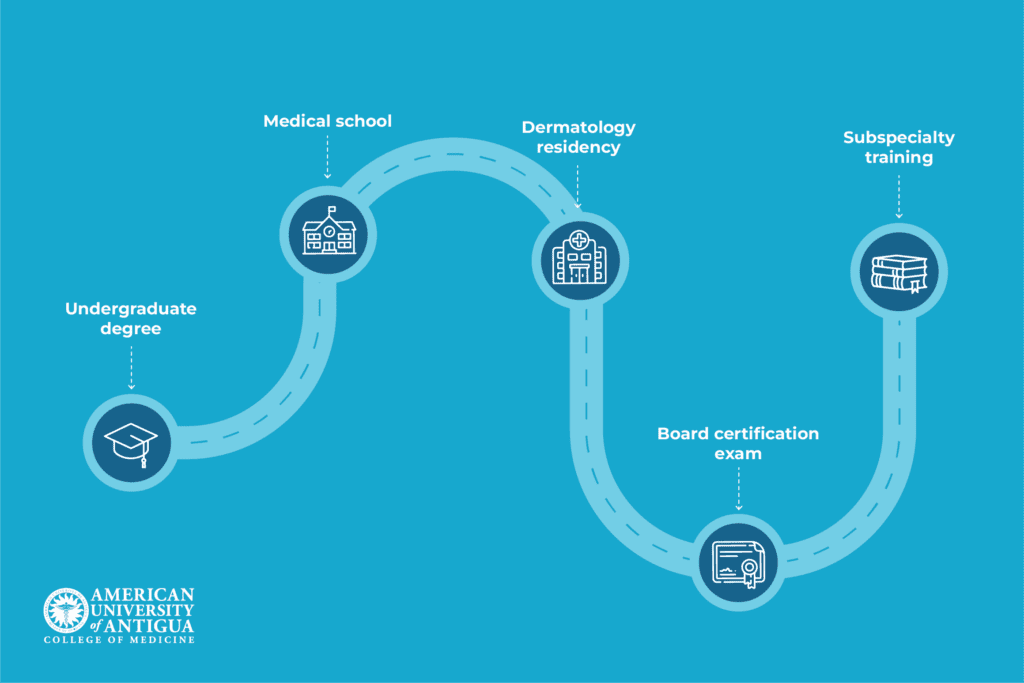What Is a Dermatologist? A Comprehensive Overview
Taking care of your skin is essential for overall wellness since the skin is the body’s largest organ, serves as the primary protective barrier against environmental elements, and reflects your overall health status. As awareness of skin health’s impact grows, dermatologists’ expertise has become increasingly vital. A dermatologist is a medical expert dedicated to diagnosing and managing skin, hair, and nail disorders.
Dermatologists are trained to address common dermatological concerns and complex cases requiring advanced medical interventions. Below, we will delve into the role of dermatologists, required education and training, benefits and challenges, salary, and job outlook. We hope that by the end of this blog, you will have enough information to decide whether dermatology is the right career choice for you.
✅ Request information on AUA's MD program TODAY!
YOUR PATH TO SUCCESS BEGINS HERE
What Is a Dermatologist?
A dermatologist is a healthcare specialist who specializes in skin, hair, and nail health. They are experts in diagnosing and treating various conditions, including acne, psoriasis, eczema, and skin cancer. Dermatologists undergo extensive education and training, starting with a bachelor’s degree, a medical degree, and then a dermatology residency. After completing their residency, typically lasting about three years, they must pass a rigorous board certification exam to practice as a dermatologist. This certification ensures they possess the knowledge and skills to provide high-quality care.
Additionally, dermatologists may pursue further specialization in areas such as pediatric dermatology, cosmetic dermatology, or dermatopathology, which involves studying skin diseases at a microscopic level. Through their expertise, dermatologists play a vital role in both the medical and aesthetic aspects of skin health, helping patients maintain and improve the condition of their skin, hair, and nails.
What Does a Dermatologist Do?
Dermatologists diagnose and provide treatment for various skin, hair, and nail conditions, covering dermatology’s medical and cosmetic aspects. Their duties include:
- Medical treatments: Managing acne, eczema, psoriasis, and skin cancer;
- Procedures: Performing skin biopsies, cryotherapy, and laser therapy to diagnose and treat conditions such as rosacea and hair removal;
- Cosmetic procedures: Offering treatments like chemical peels, Botox injections, and fillers to enhance skin appearance and address signs of aging;
- Preventive care: Emphasizing patient education on protecting skin from sun damage and managing chronic conditions.
This holistic approach ensures patients maintain healthy skin and minimize the risk of future dermatological issues.
What are common conditions that dermatologists treat?
Dermatologists treat various conditions affecting the skin, hair, and nails, including:
- Acne: A prevalent condition affecting teenagers and adults, characterized by pimples, blackheads, and cysts, which can lead to scarring and psychological distress;
- Eczema: A chronic inflammatory condition causing itchy, red, and dry skin, impacting quality of life and requiring ongoing management;
- Psoriasis: An autoimmune disorder resulting in thick, scaly patches of skin, often associated with joint pain and a higher risk of other health complications;
- Skin cancer: The most common type of cancer encompasses basal cell carcinoma, squamous cell carcinoma, and melanoma. Among these, melanoma stands out for its aggressive nature and potential to be life-threatening.
These conditions can significantly affect physical health, self-esteem, and daily activities. Dermatologists should continuously update their knowledge and skills through ongoing education and research to offer patients the most effective and advanced care options.
Benefits of Working as a Dermatologist
The benefits of working as a dermatologist are manifold, including job stability and a growing demand for their expertise.

The field of dermatology is expanding, driven by an increasing awareness of skin health and the high prevalence of skin conditions. This demand translates into strong job security and numerous opportunities across various healthcare settings. Dermatologists also enjoy a favorable work-life balance compared to other medical specialties, as they typically work regular office hours and face fewer emergencies. This predictable schedule allows for a more manageable personal life and reduces burnout.
Additionally, dermatologists have the rewarding opportunity to substantially impact patient’s lives, both medically by managing chronic and acute skin conditions and cosmetically by enhancing appearance and boosting self-esteem. The ability to improve a patient’s overall quality of life through both health and cosmetic interventions adds to the professional satisfaction and appeal of this specialty.
Challenges Faced by Dermatologists
Dermatologists face several challenges, including navigating complex insurance issues and managing high patient volumes.
Insurance barriers can complicate treatment plans and create administrative burdens, affecting patient care and practice efficiency. Additionally, the high volume of patients can create time constraints, making it difficult to provide personalized attention to each case. The emotional toll of treating severe skin conditions, such as advanced skin cancer or chronic diseases like psoriasis, can also be significant, as dermatologists often build solid relationships with patients who face difficult and sometimes distressing health issues.
Furthermore, dermatology is constantly evolving. Thus, dermatologists must engage in continuous professional development to keep pace with rapid treatment advancements. Staying current with new research and emerging therapies is essential for delivering the best care and maintaining a high level of expertise in this medical field.
Dermatologist Education and Training
Becoming a dermatologist involves a demanding and comprehensive educational journey, including:
1. Undergraduate degree: The path usually starts with earning a bachelor’s degree in a pre-medical field like biology or chemistry. This foundational education delivers crucial knowledge in life sciences and sets the stage for the demanding medical training that follows.
2. Medical school: After completing undergraduate studies, aspiring dermatologists attend medical school, which generally spans four years. This phase offers an in-depth exploration of medical sciences, including anatomy, physiology, pharmacology, and clinical skills. Students gain broad-based medical knowledge and develop their clinical acumen through hands-on experiences.
3. Dermatology residency: Upon graduating from medical school, individuals enter a dermatology residency program. This specialized training lasts about three years and focuses on diagnosing and providing treatment for skin, hair, and nail disorders. Residents gain extensive practical experience through direct patient care, including performing complex procedures and managing various dermatological conditions under the supervision of experienced dermatologists.
4. Board certification exam: Candidates must pass a rigorous board certification exam to practice independently as a dermatologist. This exam assesses their comprehensive knowledge and clinical skills in dermatology, ensuring they meet the highest standards of medical practice.
5. Subspecialty training: Some dermatologists pursue additional certifications or fellowships in subspecialties such as pediatric dermatology, cosmetic dermatology, or dermatopathology. This extra training allows them to acquire advanced knowledge and skills in specific dermatology areas, allowing them to provide specialized care tailored to unique patient needs.

The process spans approximately ten to twelve years, encompassing undergraduate education, medical school, residency, and potential subspecialty training. This demanding journey involves rigorous coursework, long clinical hours, and the competitive process of securing residency spots. Each stage of this path is designed to equip future dermatologists with the extensive knowledge, skills, and experience necessary to excel in their field and provide high-quality patient care.
What are some dermatologist subspecialties?
Dermatologists can specialize in various subspecialties, each with distinct areas of expertise:
– Pediatric dermatology: Focuses on diagnosing and providing treatment for skin conditions in infants, children, and adolescents, including congenital skin disorders and childhood-specific dermatologic issues;
– Dermatopathology: Involves the microscopic examination of skin biopsies to diagnose skin diseases, requiring deep expertise in interpreting complex skin pathology and collaborating with dermatologists for treatment guidance;
– Cosmetic dermatology: Centers on enhancing skin appearance through procedures such as Botox, laser therapies, and chemical peels, addressing aesthetic concerns and helping patients achieve their desired look.
Each subspecialty demands additional training and certification beyond general dermatology, preparing practitioners to provide highly specialized care tailored to their patient’s needs.
Salary and Job Outlook
Dermatologists enjoy a competitive salary, with the average annual income in the United States reaching approximately $386,900 as of July 29, 2024, according to Salary.com. Salaries can differ significantly based on experience, location, and subspecialty factors. For instance, dermatologists with extensive experience or those working in high-cost living areas may earn higher salaries than their counterparts in less populated regions. Additionally, subspecialties like cosmetic dermatology or dermatopathology can command higher compensation due to their specialized nature.
The job outlook for dermatologists is favorable, with a growing demand driven by increasing skin health awareness and an aging population. The Bureau of Labor Statistics forecasts ongoing expansion in healthcare careers, including dermatology. Job prospects can vary based on location and subspecialty, with urban centers and niche specialties often providing enhanced career opportunities.
Is a Dermatologist Career Right for You?
A career as a dermatologist may be well-suited for individuals with a strong interest in skin health and a passion for improving patients’ quality of life through medical and cosmetic interventions. An essential trait for success in this field is being detail-oriented, as dermatologists often deal with intricate skin conditions that require precision in diagnosis and treatment. Excellent communication skills are also crucial, as dermatologists must effectively explain complex medical information to patients and collaborate with other healthcare professionals.
If you are considering dermatology as a career path, ask yourself the following questions:
- Do you have a deep interest in dermatology and a commitment to staying updated on recent advancements in the field?
- Are you comfortable working with patients who may have severe or chronic conditions?
- Can you manage the administrative aspects of a medical practice, such as dealing with insurance and high patient volumes?
Reflecting on these aspects can help you assess whether a career in dermatology aligns with your skills, interests, and career goals.
Conclusion
Dermatologists are crucial in healthcare, specializing in diagnosing and treating skin, hair, and nail conditions. Their expertise spans from managing chronic skin diseases to performing cosmetic procedures, significantly improving patients’ well-being and appearance. Dermatology offers job stability, a balanced lifestyle, and the rewarding opportunity to make a meaningful impact on patients’ lives. The field’s growing relevance underscores its essential role in overall health.
Explore your future in dermatology with the American University of Antigua (AUA) College of Medicine. Discover our specialized dermatology program today!
Frequently Asked Questions
What is a board-certified dermatologist?
Physicians who have undergone thorough dermatology training and successfully passed the certification exam, demonstrating expertise in managing skin disorders, are known as board-certified dermatologists.
What is the difference between dermatologists and estheticians?
Dermatologists diagnose and treat skin diseases, while estheticians focus on cosmetic skincare and treatments.
When should you see a dermatologist?
You should see a dermatologist if you have persistent skin issues, unusual changes in your skin, or need medical evaluation of skin conditions.
✅ Request information on AUA's MD program TODAY!
YOUR PATH TO SUCCESS BEGINS HERE
✅ Request information on AUA's MD program TODAY!